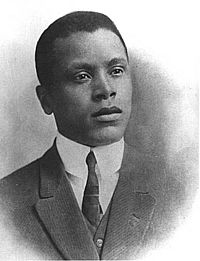Oscar Micheaux - Simple English Wikipedia, the free encyclopedia
Oscar Micheaux | |
|---|---|
 | |
| Born | Oscar Devereaux Micheaux January 2, 1884 |
| Died | March 25, 1951 (aged 67) |
| Occupation(s) | Director, writer |
| Spouse | Alice B. Russell (1892–1984) |
| Awards | Directors Guild of America Awards 1986 Golden Jubilee Special Award Hollywood Walk of Fame 6721 Hollywood Boulevard |
Oscar Devereaux Micheaux (2 January 1884 – 25 March 1951) was an American writer, movie director and independent producer of more than 44 movies. He is regarded as the first major African-American moviemaker, and the most successful African-American moviemaker of the first half of the twentieth century.[1] Micheaux was the most prominent producer of race movies. He produced both silent movies and "talkies".
Biography
[change | change source]Early years
[change | change source]Micheaux was born to former slaves on January 2, 1884, in Metropolis, Illinois. He passed most of his early years in Great Bend, Kansas. He moved to Chicago when he was 17. He worked as a Pullman porter (railroad baggage handler). In 1906, he bought land in South Dakota. He homesteaded among white neighbors for eight years.
He began to write stories. In 1913, he self-published his first novel, The Conquest: The Story of a Negro Pioneer. In 1915, he had money troubles and lost his land. He moved to Sioux City, Iowa where he ran his own publishing company. In 1917, he rewrote The Conquest and published it as The Homesteader. He sold the book door-to-door in small towns.
Moviemaking
[change | change source]An African American movie company wanted to make a movie of The Homesteader. The company however did not want Micheaux to direct it. They would not agree to a budget that met his expectations. The deal was dropped.
Micheaux then turned his publishing company into the Micheaux Film and Book Company. He sold stock in the company to raise money for his own movie of The Homesteader, and shooting began. It was the first feature-length movie made by an African American. It was released in Chicago in 1919, and was a great success.
Micheaux's second movie was Within Our Gates. This was his response to D. W. Griffith's Birth of a Nation. Griffith's movie was about the Ku Klux Klan. It was one of the most popular movies of the day. The movie challenged Griffith's message by showing that whites were more likely to harm blacks than the other way around.
Micheaux would make more than 40 movies over the next 30 years. In 1931, his movie The Exile became the first full-length sound feature by an African American. His last movie The Betrayal (1948) was the first movie produced by an African American to open in white theaters.[2]
Death
[change | change source]Micheaux died on 25 March 1951 in Charlotte, North Carolina. He is buried in the Great Bend Cemetery in Great Bend, Kansas. His gravestone reads, "A Man Ahead of His Time."
In 1986, the Directors Guild of America posthumously granted Micheaux the Golden Jubilee Special Directorial Award. In 1987, he received a star on Hollywood Boulevard's Walk of Fame.
List of selected movies
[change | change source]- The Homesteader (1919, first movie)
- Within Our Gates (1919)
- A Daughter of the Congo (1930, last silent movie)
- The Exile (first sound movie, 1931)
- The Betrayal (1948, last movie)
References
[change | change source]- ↑ Dan Moos, Outside America: Race, Ethnicity, and the Role of the American West in National Belonging, University Press of New England, 2005, p. 53, accessed 13 March 2011
- ↑ "Oscar Micheaux biography". Archived from the original on 2013-09-29. Retrieved 2013-06-01.


 French
French Deutsch
Deutsch